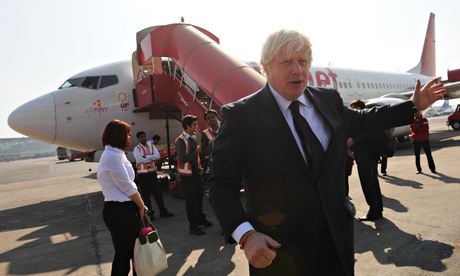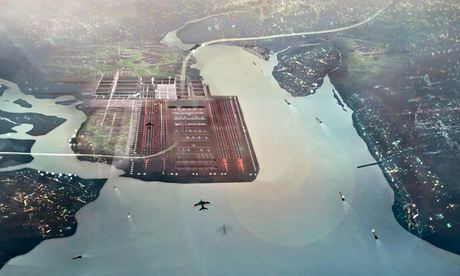The Mayor of London today urged the Commission charged with refereeing the ongoing debate about where to provide new aviation capacity in the UK to take the “bigger picture and longer view ” into account. Issuing a substantial new dossier of evidence today (23 May) the Mayor said that a national decision on airport policy was not just about where to lay the tarmac for another runway, but presented a chance to reshape the national economy to meet the challenges of astonishing levels of projected population growth, not least in London. The Mayor said that if the commission failed to look to the longer term and continued to focus on what was needed in the short term, it would be letting the country down.
Key to nearly every page of the new submission is the belief that airport policy has a huge impact on the entire fabric of society and that the decision on national aviation policy must be closely linked to the phenomenal rate of population growth in London. With London forecast to grow to 10million people by 2030 and by a staggering 37 per cent to 11.3million people by 2050, major infrastructure decisions like airport expansion have to contribute towards meeting the need for homes and jobs posed by that growth. Were a decision made to build a new airport then redevelopment of the Heathrow site could provide 90,000 jobs and 80,000 homes, adding £7.5 billion a year to the UK economy.
Today the Mayor told the Airports Commission they risked missing a once in a lifetime opportunity to end the blinkered and ‘make-do’ philosophy that had led to decades of haphazard expansion, and to recognise that the only proposal to address the wider needs of the nation would be to build a new hub airport that would generate economic benefits of at least £7bn a year, providing a secure platform for the prosperity of a growing population.
The submission to the Airports Commission has been developed with the support of world leading consultancies with specialties covering a wide range of aviation and city planning skills. And in the evidence released today the Mayor’s team declare that a new airport in the inner estuary is technically, economically and environmentally feasible. The new airport:
- Would generate a massive, permanent boost for the UK economy. It would support around 400,000 jobs UK wide, with the benefits from the extra global connectivity alone worth nearly £7bn a year. Those benefits would be far greater and much wider-reaching than single new runways at Heathrow or Gatwick.
- Is assessed as commercially viable on a standalone basis with only a small increase in landing charges – nothing like the increase claimed by the Commission.
- Faces no insuperable obstacles to its delivery. Every challenge posed can be addressed and building a new airport would be far less taxing than facing the challenges posed by the massive environmental and political undeliverability of a new runway at Heathrow.
The Mayor of London, Boris Johnson, said: “The Airports Commission has been asked to consider a subject that is of vital importance to our country’s prosperity and place in the world. It is not a small matter and their work will have ramifications for decades to come. That is why it is crucial their considerations take into account the future requirements of this country in 40 or even 50 years time. We must ensure that the final outcome is not one that future generations will regret.”
Today’s evidence included studies conducted for TfL by the Civil Aviation Authority, which show that a third runway at Heathrow would bring the number exposed to severe noise to more than one million people. Areas that would be newly caught within Heathrow’s noise contour include Kensington, Chelsea, Chiswick and Deptford. By contrast a new airport in the Thames Estuary would expose less than three per cent of the same number to aircraft noise. The document adds that scientific studies have associated loud and sustained noise with adverse health impacts, including increased risk of hospital admission for stroke and cardiovascular disease, higher rates of hypertension and lower reading ages in children.
Other key points made in the submission include that:
- By 2050, a new hub airport would provide 63 more daily regional air connections than if no additional hub airport capacity is provided, which is 43 more than today and 49 more than Heathrow could sustain with a third runway.
- A new airport in the Inner Thames Estuary would add 134,000 net additional jobs in the local area by 2050 – equivalent to £16.6bn GVA per annum – and trigger a further 138,000 catalytic jobs across the whole region. Nationally, an inner Thames estuary airport would support 388,000 gross jobs by 2050, worth £42.3bn per annum in GVA terms.
- Having a strong hub airport serving the UK is vital to the economies of the UK regions. It would provide a £2.2 billion economic boost to 15 major UK cities by 2050 and deliver 18,000 new jobs thanks to the improved connectivity that a new, unconstrained airport would deliver.
- The additional connectivity would improve UK productivity, resulting in a permanent 0.5% increase in GDP – valued at £6.9bn in today’s prices.
- By contrast, the Airports Commission’s own figures demonstrate that a 3-runway Heathrow would effectively be full shortly after opening, with limited slot availability and very poor resilience – little improvement on Heathrow today.
- A second runway at Gatwick is no solution either – it fails to address the dire noise problems; unable to function as a hub alongside Heathrow it cannot deliver the connectivity the UK needs; and as a result offers the smallest economic boost of any of the options being considered.
Today’s submission also reaffirms a key conclusion of TfL’s submission to the Airports Commission in 2013: that building and moving to a new airport can be assessed as commercially viable, on a standalone basis, with a relatively modest increase in landing charges.
A new analysis undertaken by Ernst & Young concludes that a threefold increase in landing charges, claimed by the Airports Commission to be necessary to repay debt by 2050, is based on assumptions that are without any local or global precedent; adjusting these assumptions brings the required increase in landing charges down significantly, to 1.4x Heathrow’s Q6 level. Indeed, KPMG (the Commission’s own financial advisers) acknowledges the 2050 assumption as “arbitrary” and the approach “highly simplified”, and that, under different assumptions, an increase of just six per cent would be needed.
It was confirmed today that the Mayor and Sir Howard Davies will both attend and speak at a major event on 18 June where the challenge of London’s growth will be addressed. Further details and invitations to the “Shaping a growing London: the place of an airport” event will be released within the next week.


